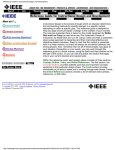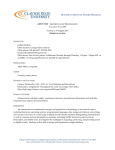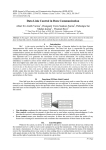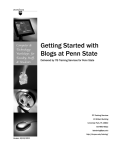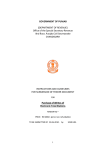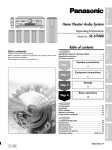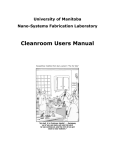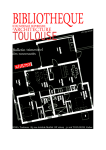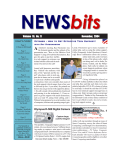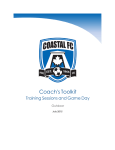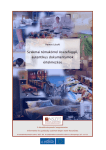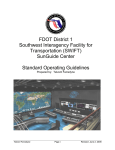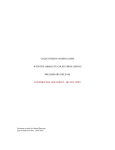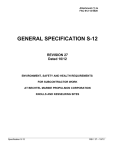Download ENC 3242 - University of South Florida Sarasota
Transcript
SYLLABUS FOR ENC 3242: TECHNICAL COMMUNICATION FOR MAJORS • FALL 2015 University of South Florida Sarasota-Manatee (USFSM) • Instructor: T. E. Roberts ([email protected]) Website for this course on the public internet: http://www.todroberts.com/USF/3242_welcome.htm • Date: August 12, 2015 WELCOME This syllabus is a contract. It sets forth expectations, responsibilities, instructions, and policies that obligate both instructor and students. Read and consult it throughout the Fall 2015 semester. Every student is expected to submit via email a signed information sheet indicating that he or she has read this syllabus and agrees to abide by its terms; this form also functions as a record of first-week attendance in this online course. If it is not received by Saturday, Aug. 29, midnight, the student will be reported to the registrar as “not attending” and will be dropped from enrollment. The link for this form is here: http://www.todroberts.com/USF/3242_Fall15_Bkgrnd.docx. It is also available in the FILES section of the Canvas space for this course. This document is subject to change before the term begins on Aug. 24, 2015. If you find an error in the syllabus, please accept my apology and notify me immediately. To download the student information sheet and the most current version of the syllabus, please see the course website: http://www.todroberts.com/USF/3242_welcome.htm. In cases where information in this syllabus differs from what appears on the course website, the website should be regarded as the most current and authoritative source. I. COURSE NUMBER AND TITLE ENC 3242, Technical Communication for Majors, Fall 2015; Section 521, CRN 93021, ONLINE COURSE. There will be no meetings on campus at all. However, this is not a “correspondence course” in which one merely writes and submits assignments. Students will be required to hear and take notes on lectures, complete assigned reading, and communicate with the instructor (and fellow students, as needed) regularly via email or the Canvas discussion forum. II. INSTRUCTOR CONTACT AND BACKGROUND INFORMATION Instructor: Thorold (Tod) Roberts. (Please refer to me as “Mr. Roberts.”) Send email to [email protected]. (Spell my email address accurately!) Most of our communications will be via email, but if necessary, please phone me at 941-927-2898 (Sarasota residence) between 9:00 a.m. and 5:00 p.m. Monday through Friday. (I prefer email because it creates a written record of our communications and because it gives students practice in writing, one of the main purposes of the course.) Because I am rarely on campus, do not leave a message on my campus phone or in my campus mailbox. You have no restrictions on the length or number of emails you may exchange with me, but please use good judgment in this matter. Because of the large volume of email I handle, every message you send must bear your last name and the course number in the SUBJECT line (for example: “Robinson, Question on ENC 3242, Assignment 2”). If a student question or comment appears of general value or relevance, I will send it and my response to all students in the course. For my background, see http://usfsm.edu/faculty-members/prof-thoroldtod-roberts/. For students’ numeric scores and comments on my past USF courses, see http://www.todroberts.com/USF/Roberts_Evaluations.htm. If you want to meet with me in person, please arrange an appointment. Because of my driving distance from campus and because all of my teaching is online, I prefer to schedule such meetings when I am present for other faculty activities. It may also be possible to meet off-campus, via phone, or via Skype over the internet. Please schedule a call first via email. For help with Canvas, USF email, OASIS, or other technology, see http://it.usf.edu/, send an email ([email protected]), or call 866-974-1222. III. COURSE DESCRIPTION AND PURPOSE From the USF Catalog: (Prerequisites: ENC 1101 and ENC 1102, or ENC 1121 and ENC 1122) The study of the range of possible careers for technical communicators with special emphasis on the issues that professional writers face in various workplace contexts and on the skills needed in word processing (not restricted nor repeatable). IMPORTANT: Students enrolled in this course should be pursuing the B.A. in Professional and Technical Communication, the Business and Technical Writing concentration within the English major or minor at USFSM (if you first enrolled before Fall 2013), or the Professional and Technical Communication Undergraduate Certificate. If you are not such a student, you should consult your academic advisor about dropping this course and replacing it with one appropriate to your field of study. Note also that this is an Upper-Division “Pillars” Course approved for meeting the LEADERSHIP/ETHICS category of such courses. IV. COURSE GOAL To help the student identify and appreciate business and technical writing career opportunities and to pursue the skills and knowledge needed to exploit those opportunities. V. COURSE LEARNING OBJECTIVES 1. Show ability to create clear concise, and complete messages that meet needs of intended users and readers. 2. Meet stated deadline for assigned project. 3. Show ability to create and transmit messages in such diverse media as print, audio, video, in-person presentation, and internet. 4. Show knowledge and sound judgment in using effective communication concepts, theories, tactics, and strategies appropriate for intended project results. ENC 3242 Syllabus - T. Roberts, Instructor - Fall 2015 - August 12, 2015 - page 2 of 10 5. Show ability to interpret and edit messages from advanced Subject Matter Experts (SME’s) and transmit said messages effectively to nonexpert users. VI. ENC 3242 COURSE CONTENT AND METHODS OF INSTRUCTION The assignments draw on the instructor’s experience as a professional writer and editor serving clients and employers in diverse business settings and as a university teacher of writing. In addition to written assignments, the course requires familiarity with an online textbook, writing handbooks, online lectures, basic website design, and email exchanges, as detailed in the Schedule of Weekly Assignments below. It also requires the use of computerized word processing using MS Office software, electronic communications, and internet-based research. Each student must have access to a reliable computer and knowledge of how to use it for word processing, email, internet search, and access to the password-controlled USF Canvas online learning system (my.usf.edu). Course Content: Each of the first three writing assignments will be around 500 to 1,000 words long; Assignment 4 will consist of a 1,500- to 2,000-word prose document and other components. No conventional printed textbook is required; instead you will be assigned selected readings from the internet which supplement web-posted audio/PowerPoint lectures. A final exam covering course content will be taken online via Canvas between Dec. 7 and 10. All students are required to complete an online evaluation of the course via my.usf.edu at the end of the semester and to email the instructor a confirmation of that evaluation (directions for this will be posted later on the course website). (See “Official USFSM Policies and Procedures” in Section XI of this syllabus.) Method of Presentation: Students will perform in a distance-learning environment, with guidance from the instructor. Course objectives and procedures will be presented in the first lecture before the session begins on Aug. 24, 2015. Your official USF email address will be used for most communications; if you forward mail from there to your personal address, be sure you are receiving all messages. An individual student’s questions and my emailed responses will be sent to all students if the questions and answers appear to be generally relevant and useful. I welcome student emails about assignments, lectures, or other aspects of the course as long as they are focused, relevant, and professional. Although I receive hundreds of messages from students, I try to answer all email promptly. If you use a mobile phone to receive and respond to email, be sure that you are saving all course-related messages and attachments to your computer. Students who fail to do this may encounter problems leading to possible loss of learning progress and grade points. Canvas and Other USF Technology Tools: For help on the USFSM campus, please email or call Tony Spall (941.359.4202 or [email protected]), or visit this web page: http://usfsm.edu/e-learning-services/instructional-support/. For general off-campus help with Canvas, USF email, OASIS, or other USF technology, see http://it.usf.edu/, send an email ([email protected]), or call 941-359-4295 (or -4215), or 813-9741222 (Tampa). For live online help, see http://usffl.service-now.com. Lectures: As noted on the course website, you will download two lecture files (.mp4 audio and PowerPoint slides) each week. Depending on the capabilities of your computer, you may need use either Apple QuickTime or VLC Media Player (see links for these free downloads on course website) to hear the MP4 files on your computer. Do not try to hear the lecture audio as a streaming file over the internet -- you may find it interrupted. Just download and listen to each lecture on your computer while viewing the PowerPoint slides. Save the audio and the slides inside your 3242 folder -- you will need to review them to prepare for the final exam. The lectures provide important information on written assignments and overall learning content in the course. (Note that the MP4 audio and PPT lectures are also downloadable from the FILES section of the Canvas listing for this course.) Audio Codes to Facilitate Attendance Checking. To simulate in an online environment the required tracking of student attendance expected in an on-campus class, each audio lecture will contain embedded spoken code words which you must send to me via email by deadlines noted in the Weekly Schedule below. This will ensure that you are listening to the lectures soon after they are posted, and not letting them accumulate for later listening. Regular listening to -- and note-taking on -- lectures is vital to your success in the course. Failure to send the audio codes by deadline may result in two unpleasant consequences: (1) ignorance about assignment instructions leading to weak performance and (2) a penalty to your final grade in the course. REALITY CHECK: Any student who rushes through a lecture’s audio file merely to grab the audio codes and thus ignores the content of the lecture would be wise not to take this course at all. If you have no more interest in learning than this, drop out of school and do something else so you can make room for a serious student. Email Messages: You will send me all assignments attached to email messages as MS Word files with the .doc or .docx file extension. I will evaluate and grade your work electronically and, as explained below, return it to you by email upon request. Be sure to indicate your preferred email address if it is not obvious from your message. I will acknowledge, via email, the receipt of your email message and attachment. All of your written work must bear a filename in this format: Lastname_3242_X.doc (or .docx) (no spaces), where X refers to the assignment number (1, 2, 3 or 4). Do not send your work with a generic name such as “Assignment2.doc” or “research.doc.” The first time you do this, I will ask you to fix it. If this happens again, your submission will simply be counted as missing and will be penalized accordingly. Orderly procedures and file naming are essential because I serve scores of students who submit hundreds of thousands of words of gradable work to me. (I receive and answer 100 to 150 student emails per week.) Occasionally a student or instructor or both may experience problems with email. If this happens, notify me by phone (941-927-2898) and, if necessary, send a message to my alternative email address ([email protected]). If you do not receive my prompt response to an emailed assignment or a question, contact me as soon as possible. As noted above, each email requires a subject line with your name, the course number (3242), and a brief phrase such as “Assignment 2 question.” Make sure your USF email account is working, especially if you have messages forwarded from there to a different address. ENC 3242 Syllabus - T. Roberts, Instructor - Fall 2015 - August 12, 2015 - page 3 of 10 VERY IMPORTANT: Be sure you receive my acknowledgment of your assignment submission. If you do not receive such a message by 9 p.m. following a 6 p.m. deadline, send the document to me again. Otherwise, your work will be penalized for being late or missing. I will normally use the email header time-stamp to determine whether you have met the deadline or not. (See Section VIII, Grading and Evaluation, for information on the penalty for late submissions; for information on email headers, see http://www.todroberts.com/USF/Email_Headers.pdf.) Check the clock in your computer to ensure that it is accurate. I am too busy to acknowledge all submissions as they arrive, so please do not call or email me about your submission if you send it before the 6 p.m. deadline. I will usually acknowledge submissions AFTER the 6 p.m. deadline, not before. Last Day to Withdraw from a Fall 2015 Course Without Academic Penalty (and Without Refund of Fees): Saturday, Oct. 31, 2015, 5 p.m. Confer with your academic advisor before this date to discuss the impact of this action on your degree progress and student loan status. If you are not submitting required work but remain in the course, you will likely earn an “F.” (USF imposes limits on the number of times one can withdraw from a course without penalty; check with your advisor.) Format for Written Assignments: See the formatting instructions included with the assignment directions. Formatting is an important element of professional writing and as such will play a role in your learning experience and grade. All written assignments must be prepared on a computer (Macintosh or PC) using Microsoft Word or equivalent software. NOTE: If you use MS Works or WordPerfect or any software package other than MS Office, you must create and save a document as a WORD file (ending in .doc or .docx). Do not use the proprietary Apple software PAGES for your documents. You will not receive credit for work that I cannot read using MS Office on the Macintosh. If you lack MS Office for your personal use, you may also use a shareware program called OpenOffice (www.openoffice.org), but you may find it limited compared to the Microsoft version. Check with USF Computer Store (http://www.computerstore.usf.edu/) for discounts on MS Office software. Computer Use: All professional writing today requires use of a computer and the internet for document preparation and revision, research, and communications. Put all work for the course (assignments, drafts, email messages, syllabus, bookmarks, lectures, etc.) into a separate folder labeled 3242_Fall14. Back up that folder at least weekly on a USB flash drive, CD-ROM, or online archive. Send a copy of your messages and attachments to your secondary email address for safe-keeping. An assignment lost as a result of carelessness or ignorance will diminish your learning experience and grade. If an assignment calls for the use of unfamiliar tools such as PowerPoint for slides, advanced application of MS Word or Excel, or a website composition tool such as WordPress, budget the time and effort required for you to learn them. Those seeking a professional career today simply cannot survive without such knowledge. Course Website: http://www.todroberts.com/USF/3242_welcome.htm. Links to syllabus, assignments, lectures, and helpful resources are available on this site. Students should visit this page at least daily. Read all links on this page before the end of the Fall 2015 session (they are all subject to being covered in the final exam). Specific links of most relevance to the final exam will be highlighted a short time before the exam. If you find a link not functioning correctly, please report it to me promptly by email. Student Success in This Course: To succeed in ENC 3242, think and act like a professional, not like a student. Put learning ahead of grades and challenge yourself to work beyond your comfort zone. Read and respond to email, submit work on time, read all assigned material, listen to and take notes on lectures on schedule, keep your mind open and unbiased, and ask questions. If you are like most USF SarasotaManatee students, you are probably not only studying for a degree but also earning a living and perhaps caring for a family. Thus, to succeed in ENC 3242, especially in a primarily online environment, prioritize your time and effort wisely. Online courses require maturity and self-discipline. Your investment in improved writing and thinking skills will pay off significantly over the course of your career. If you doubt this, talk to students who have already taken my writing courses at USFSM and are now working as successful professionals. As the instructor, I am eager for you to experience an excellent return on your investment of time, money, and intellectual energy. If you are not having such an experience, contact me immediately so that we can work together in solving problems and taking advantage of opportunities. Do not assume that you are a mere number in a vast bureaucracy. To me, you are an individual human being who is sincerely willing to improve his or her abilities using the opportunities available to you. Attendance, Absences, Making Up Work, Extra Credit: Because this course is delivered 100 percent online, conventional attendance records are irrelevant. However, the required submission of audio codes for online lectures functions as a simulated means of checking “attendance.” The specific rules regarding audio codes are explained above (see “Lectures”). There is no provision for the following privileges: instructor review of a draft submission in advance of grading, re-doing an assignment already submitted, re-writing a plagiarized submission, grade forgiveness, grade rounding, extra credit, makeup work, or grade negotiation. Grades are calculated mathematically by the Canvas learning management system based on the instructor’s grade weighting scheme. Penalties for late submission of student work are specified below in Section VIII, “Grade Penalty for Missing an Assignment Deadline.” USF Academic Calendar, Fall, 2015 (for details, see http://www.usf.edu/registrar/calendars/index.aspx) Mon Aug 24: first day of classes Mon Sep 7: Labor Day Sat Oct 31: Last day to drop class without academic penalty Wed Nov 11: Veteran’s Day Thu-Fri, Nov 26-27: Thanksgiving holiday Fri, Dec 4: Last day of classes Sat-Fri, Dec 5-11: Final exam week VII. SCHEDULE OF ENC 3242 WEEKLY ASSIGNMENTS, FALL 2015 Detailed directions for all written assignments will be provided via lectures, email, and website posting. Assigned readings will be announced via lecture and email. Note that, unless modified by email announcement, all written assignments are due to me on Mondays by 6:00 p.m. but may be submitted earlier if you wish. Lectures discussing assignments and course content will be posted on the course website and in the FILES ENC 3242 Syllabus - T. Roberts, Instructor - Fall 2015 - August 12, 2015 - page 4 of 10 section on Canvas as both PowerPoint slides and as audio recordings in MP4 format, usually by Monday. You must send lecture audio codes via email as noted below. This schedule is subject to change because of circumstances beyond the instructor’s control. Check your email at least daily for announcements. ENC 3242 FALL 2015 SCHEDULE DATE EVENT OR TASK LECTURES & WRITTEN ASSIGNMENTS Semester begins Aug. 24; intro lecture will cover course objectives and content; send background information via email by Saturday, Aug. 29, midnight, or you will be dropped from enrollment Lecture topic relevant to current assignments; readings will be assigned via email Assignment 1 (20% of grade) - Teach a technical task (prose, slides, website, and/or YouTube video); send codes for Weeks 1 + 2 Lecture topic relevant to current assignments; readings will be assigned via email Lecture topic relevant to current assignments; readings will be assigned via email Lecture topic relevant to current assignments; readings will be assigned via email Assignment 2 (20% of grade) - Interview a BTW Professional; send codes for Weeks 3, 4, 5 Lecture topic relevant to current assignments; readings will be assigned via email Lecture topic relevant to current assignments; readings will be assigned via email Lecture topic relevant to current assignments; readings will be assigned via email Assignment 3 (20% of grade) - Solve a communications crisis; send codes for Weeks 6, 7, 8 Lecture topic relevant to current assignments; readings will be assigned via email Before Aug 24 WEEK 1 LECTURE Sep 1 (Mon) WEEK 2 LECTURE Sep 7 (Mon) Assignment 1 - 6 pm Sep 14 (Mon) Sep 21 (Mon) Sep 28 (Mon) Sep 28 (Mon) Oct 5 (Mon) Oct 12 (Mon) Oct 19 (Mon) Oct 19 (Mon) Oct 26 (Mon) WEEK 3 LECTURE WEEK 4 LECTURE WEEK 5 LECTURE Assignment 2 - 6 pm WEEK 6 LECTURE WEEK 7 LECTURE WEEK 8 LECTURE Assignment 3 - 6 pm WEEK 9 LECTURE Oct 31 (Sat) LAST DAY TO DROP Last day to drop course without academic penalty (by 5 p.m.); consult with your academic advisor about the impact of this decision on your degree progress and student loan status (max number of withdrawals is limited). Nov 2 (Mon) Nov 2 (Mon) Nov 9 (Mon) Nov 16 (Mon) Nov 23 (Mon) Nov 30 (Mon) WEEK 10 LECTURE Assign 4 outline - 6 pm WEEK 11 LECTURE WEEK 12 LECTURE WEEK 13 WEEK 14 LECTURE Nov 30 (Mon) Assignment 4 - 6 pm Dec 4 (Fri) Dec 6 (Sun 8 am) to Dec 9 (Wed 11 pm) End of Fall semester Lecture topic relevant to current assignments; readings will be assigned via email Assign 4 - 150-word outline (required but not graded); send codes for Weeks 9 and 10 Lecture topic relevant to current assignments; readings will be assigned via email Lecture topic relevant to current assignments; readings will be assigned via email Thanksgiving holiday -- no lecture (campus closed Nov. 26-27) Final lecture - exam preparation tips; send course evaluation -- deadline and instructions TBA Assignment 4 (30% of grade) - Three options (to be discussed in lectures and emailed directions); send Week 11, 12, and 14 codes (1500-2000 words) Classes end; final exams are held Dec 6 through 11 45-minute exam (10% of grade): multiple-choice and true/false; covers syllabus, website links, readings, assignments, course-related emails, and lectures; USFSM Commencement on Sunday, Dec. 13; final grades will be posted on OASIS by Tue, Dec 16, 2015 Final Exam (Canvas) VIII. TEXTS AND OTHER RESOURCES • • • • • Required texts (all free downloads): Technical Communications Career Research links; Chapter 1 of Technical Communication: A ReaderCentered Approach, 7th edition (free PDF download at this link); Online Technical Writing Text (free) See list of recommended texts on course website: http://www.todroberts.com/USF/3242_welcome.htm Computer literacy (Mac or PC), Microsoft Office or equivalent software, Internet access, email account, and collegiate dictionary Competence in English grammar, vocabulary, spelling, sentence structure, document organization, and research skills expected of 4thyear college undergraduates Access to handbook of English usage, online or on paper (an effective online handbook is at http://owl.english.purdue.edu/; also, memorize the USAGE TIPS at the end of this syllabus) Miscellaneous web-based information assigned or recommended by instructor IX. GRADING AND EVALUATION The grade you earn on an assignment will be a numerical score. For assignments in this course and for the Fall 2015 semester total weighted score, numerical values are equated with letter grades as shown below: A = 100-95 A- = 94.999-90 B+ = 89.999-86 B = 85.999-84 B- = 83.999-80 C+ = 79.999-76 C = 75.999-74 C- = 73.999-70 D+ = 69.999-66 D = 65.999-64 D- = 63.999-60 F = 59.999-0 No assignment submitted = zero points; note that this scale differs from the generic scale on Canvas, just as students and instructor differ from their “generic” counterparts. Definitions of Grades A = exceeds objectives of the assignment; three or fewer major errors in language usage, sentence structure, or organization; clear, logical thought; originality, creativity, and maturity B = meets objectives of assignment; no more than four major errors in language usage, sentence structure, or organization; logical but uninspired thought; no major surprises C = meets objectives but just barely; five or more major errors in language usage, sentence structure, or organization; some lapses in logic; often, a cautious effort to “give the instructor what he wants” ENC 3242 Syllabus - T. Roberts, Instructor - Fall 2015 - August 12, 2015 - page 5 of 10 D = tries but fails to meet objectives; six or more major errors in language usage, sentence structure, or organization; jumbled, weak flow of ideas; confused understanding of the assignment F = complete failure to meet objectives of the assignment NOTE: A “major error” is defined as one that creates confusion or an impression of unprofessional practices; this includes, but is not limited to, comma splices, sentence fragments, fused or run-on sentences, pronoun misuse, punctuation mistakes, spelling errors, and misused words (for instance, using “service” as a verb when the correct word is “serve”). Note also that an accumulation of several “minor” errors may cause as much harm as a few “major” errors. A misspelling of “moral” for “morale” (or vice versa) may appear minor, but your reader may find it grounds for doubting your knowledge, skill, and credibility. Such errors may even cause you to lose a job. Although some students may believe that strict standards of correctness in speech and writing are passé, they will be in for a major surprise when a boss or client explodes in a fury over a “simple misspelling or typo.” For more details about the definitions of grades, see http://www.todroberts.com/USF/grade_penalties.pdf. Use oldfashioned flash cards for learning the Usage Tips at the end of the syllabus. Final Grade in Course: Your final grade in the course will be computed on Canvas using the following weighted formula: 60%: Assignments 1, 2, and 3 (20% each, 500-1000 words each) 30%: Assignment 4 (1,500 to 2,000 words) 10%: Final Exam (via Canvas, Dec 6-9) The final grade, as explained below, will be reduced by penalty points (if any) for failing to send lecture audio codes on time. To repeat my earlier point, no extra credit, do-overs, grade rounding, makeup work, grade forgiveness, or grade negotiation are allowed, so please do not request such considerations. The grade you earn, not the grade that I “give,” is what I report to the registrar using the following plus-and-minus scale: A = 4.00 A- = 3.67 B+ = 3.33 B = 3.00 B- = 2.67 C+ = 2.33 C = 2.00 C- = 1.67 D+ = 1.33 D = 1.00 D- = 0.67 F = 0.00 Student Evaluation of Instructor and Course: All students are required to submit a fair and complete online evaluation of the course through eXplorance and to send the instructor verification of this submission. Instructions and deadline for this will be announced via email. Grade Penalty for Missing an Assignment Deadline: Because deadlines for on-the-job communication are taken seriously by clients and employers, deadlines in this course will be treated the same way. An assignment loses one entire grade -- for example, from a “B” (85) to a “C” (75) -- for each 24-hour period (or portion thereof) it is late (including weekends and holidays). A penalty for late submission begins at the hour when the assignment is due (usually Monday at 6:00 p.m., via email). The clock time noted by your outgoing email server will determine whether you have sent the submission by the deadline. ** IMPORTANT: IF YOU DO NOT RECEIVE MY ACKNOWLEDGEMENT OF YOUR SUBMITTED ASSIGNMENT, SEND IT AGAIN. OTHERWISE YOU RISK A PENALTY FOR LATENESS. ** As mentioned previously, I am too busy to acknowledge all submissions as they arrive, so please do not call or email me about your submission if you send it before the 6 p.m. deadline. I will usually acknowledge submissions AFTER the 6 p.m. deadline, not before. To extend a deadline without penalty, you must present compelling evidence of need as defined by the instructor. This varies in individual circumstances, but such leniency is more likely for a student who has demonstrated a desire to work hard and succeed in the course by, for example, submitting optional revised work. You are always much better off turning in a late assignment than none at all. The grade of “F,” at 59 points, will be far less damaging to one’s final course grade than a score of zero points for a missing assignment. If you’re inclined to regard this as a harsh penalty, here’s a thought to ponder: Lateness in meeting a deadline on the job usually results in your being demoted or even fired or, if you are an independent contractor (freelancer), losing a client. Grade Penalty for Failing to Hear Lectures On Time: The codes embedded in the lecture audio files must be sent to me via email along with your written assignments, as shown in the weekly schedule noted above. For example, your email transmission of Assignment 1 will not only include your attached submission with .doc file extension, but also in the body of your email you will note the audio codes for the Week 1 and 2 lectures by matching a specific code to a specific slide (EXAMPLE: Slide 3: document, Slide 7: edit, Slide 11: submit). You will lose two points from your final grade calculation for each missing set of codes and one point for each set sent late. This will be computed manually at the end of the Fall 2015 term. EXAMPLE: your total points earned on assignments are 86 (B+), but you sent three lecture code sets late and failed to send two sets at all. This means you would lose seven points from your total, resulting in a final grade (to be reported to the registrar) of 79 (C+). Inability to Complete Course Requirements On Time: A mark of “Incomplete” is allowed only in rare cases such as a documented health crisis or family emergency. You may be required to submit a Medical Form to the Academic Regulations Committee (available at http://www.usf.edu/registrar/resources/forms.aspx). Allowing an “I” grade is up to the instructor’s discretion; it must be requested in writing. The policy as stated in the USFSM 2015-2016 undergraduate catalog is as follows: “I” Grade Policy (http://usfsm.edu/catalog/graduate/academic-policies-regulations/graduate-grading-system/incomplete-i/) Definition: An Incomplete grade (“I”) is exceptional and granted at the instructor’s discretion only when students are unable to complete course requirements due to illness or other circumstances beyond their control. This applies to all gradable courses, including pass/fail (S/U). Students may be eligible for an “I” only when: • a majority of the student’s work for a course has been completed before the end of the semester • the work that has been completed must be qualitatively satisfactory • the student has requested consideration for an “I” grade as soon as possible but no later than the last day of finals week. ENC 3242 Syllabus - T. Roberts, Instructor - Fall 2015 - August 12, 2015 - page 6 of 10 The student must request consideration for an Incomplete grade and obtain an “I” Grade Contract from the instructor of record. Even though the student may meet the eligibility requirements for this grade, the course instructor retains the right to make the final decision on granting a student’s request for an Incomplete. The course instructor and student must complete and sign the “I” Grade Contract Form that describes the work to be completed, the date it is due, and the grade the student would earn factoring in a zero for all incomplete assignments. The due date can be negotiated and extended by student/instructor as long as it does not exceed one semester from the original date grades were due for that course. The instructor must file a copy of the “I” Grade Contract in the college that offered the course by the date grades are due. The instructor must not require students to either re-register for the course or audit the course in order to complete the “I” grade. Students may register to audit the course, with the instructor’s approval, but cannot re-take the course for credit until the I grade is cleared. An “I” grade not cleared within the next academic semester (including summer semester) will revert to the grade noted on the contract. “I” grades are not computed in the GPA, but the grade noted on the contract will be computed in the GPA, retroactive to the semester the course was taken, if the contract is not fulfilled by the specified date. When the final grade is assigned, if applicable, the student will be placed on academic probation or academically dismissed (refer to Automated Academic Probation Procedures for information). Students cannot be admitted to doctoral candidacy or certified for graduation with an “I” grade. Example: Current Semester • student has a “B” in the course, not including the grade for the missing assignment, therefore is eligible for an “I” • student’s grade, including a zero for the missed work, would be a “D” • student and instructor complete the “I” Grade Contract, assigning an “ID” (Incomplete +”D” grade) Deadline Agreed Upon in Contract (e.g. two weeks)* If the student completes the work as agreed upon in the Contract by the noted deadline • instructor submits a change of grade • student earns final grade comprised of all completed course work If the student does not complete the work as agreed upon in the Contract by the noted deadline • “I” automatically drops off and the grade of “D” remains. • GPA is recalculated for the current semester and retroactively recalculated for the semester in which the “I” was granted. *Although the instructor establishes the deadline for completion of the work, the deadline may only extend through the end of the subsequent semester. Grading Process. I do not return your graded submission to you except upon your request. You have two options in this process: Option 1. If you want the submission returned with detailed marks and comments, you must agree to rewrite or revise the entire paper in response to those comments and marks. The revision is due to me no later than one week after you receive the marked paper from me. If you choose this option, the submission you send must be labeled Lastname_3242_X_markup.doc, where “X” refers to the assignment number. You will receive from me a document labeled Lastname_3242_X_markup_graded.doc. You will then rewrite/revise this and return it to me labeled Lastname_3242_X_revised.doc. Omit spaces and insert underscores in filenames exactly as shown. Leave all of my original marks and comments in place and insert your revisions nearby in blue boldface text so that I can quickly compare the original and the revision. (See detailed revision instructions and sample revision on course website, http://www.todroberts.com/USF/3242_welcome.htm.) This option is not available for work submitted after deadline unless the penalty for such lateness has been waived by the instructor. Option 2. If you want your grade simply posted on Canvas with no marks, comments, or returned submission, just name your file Lastname_3242_X.doc. The rewriting/revision process is entirely your option, not a requirement. You may choose to revise one or more of Assignments 1 through 3. (Assignment 4 occurs too late in the term to allow revision; however, I will email you a comment if you submit with this filename: Lastname_3242_4_comment.) I do of course evaluate your work carefully, but I provide detailed comments only for those papers on which students are willing to perform the extra work needed for revising the submission. IMPORTANT: Submitting the revised/rewritten submission will NOT result in a change in your grade except under this condition: If you request the detailed mark-up, you must submit the revised work within one week of receiving it graded from me. If you do not, your grade will be dropped by one grade (10 points) -- for example, from a B+ to a C+. Please note that grading a student paper is considerably more demanding than simply reading it; the intensity of this process, combined with other faculty duties, permits me to evaluate only about 10 to 15 submissions per day; given my typical workload of 75 to 80 students per semester, you should not expect a grade to be posted sooner than a week after you submit your work. Reason for This Grading Process: Because of my heavy teaching load (around 450,000 words of graded student writing per semester), I lack the time needed for marking all student work in sufficient detail as a regular procedure. My grading process therefore offers a compromise. It recognizes that some students are content merely to pass the course in order to satisfy a graduation requirement. This usually means they are willing to settle for an “acceptable” grade. A student’s definition of “acceptable” varies, but based on my experience, many students are satisfied with anything from a “C” to an “A.” Students who are enrolled just to satisfy a graduation requirement will likely have personal reasons for not wanting to submit a complete revision. They may be too busy with other courses, jobs, or other responsibilities, or they may simply regard the revision process as not worth the required work. However, this opportunity is open to every student. The amount of effort for me as instructor to prepare a detailed mark-up (typically requiring 30 to 40 minutes per individual submission) is commensurate with the extra effort required by the student to revise it. This effort is understandably beyond what some students prefer to do or ENC 3242 Syllabus - T. Roberts, Instructor - Fall 2015 - August 12, 2015 - page 7 of 10 have time to do. However, I do not discriminate in any way against those who do not want to perform this extra work. I merely offer an opportunity for this expanded learning experience to those who see value in such an approach. IMPORTANT: Students have no obligation to take advantage of the rewriting process and will suffer no direct penalty for not participating in this additional work. It should be obvious to you, however, that optimal learning is more likely with, than without, the extra work. Special Note for pre-Fall-2013 Students Concentrating in Business and Technical Writing (BTW) or those enrolled in Fall 2013 or later pursuing the B.A. in Professional and Technical Communication (PTC): Students in this discipline should not enroll in ENC 3242 merely to satisfy a graduation requirement. They should be serious about honing their writing and editing skills to the level required of a professional who can earn a living using the knowledge and experience gained in this field of study at USFSM. They are therefore expected (but not required) to request detailed markup and to submit revisions of their work. Word to the wise: any BTW student or PTC major who fails to request detailed markup should be aware that this fact will be noted as negative feedback on future Letters of Reference prepared by the instructor. Grievance Procedure for USF Students: The USFSM Undergraduate Catalog (USF Policy 10-002, “Student Academic Grievance Procedure," http://usfsm.edu/catalog/academics/student-academic-grievance-procedure/), emphasizes that a student should first contact the course instructor before filing a grievance: III. Statement of Policy A. Resolution at the Department Level. 1. The student shall first make a reasonable effort to resolve his or her grievance with the instructor concerned, with the date of the incident triggering the start of the process (i.e. the issuance of a grade; the receipt of an assignment) and if the instructor determines is feasible and may be productive, the instructor shall accommodate a reasonable request to discuss and attempt to resolve this issue. If, after conferring with the instructor, the student believes he or she is justified in filing a formal grievance, the procedures outlined in the USF Undergraduate Catalog must be carefully followed. A grievance is an extremely grave and formal matter that requires many hours of attention from the student, the faculty, and USF administration. Therefore, pursue it only when other means of redress have completely failed. Advice About Grades: A grievance will not automatically or necessarily result in a change of grade for an assignment or a course. Over the course of several decades teaching thousands of college students, I have seen only two of my students file formal grievances (1974 and 1997), and in both cases my original grade and teaching approach were upheld by a grievance committee of students and faculty. I take seriously my duty to be not only a competent and effective instructor but also to help you succeed, not fail. If you believe I am not meeting your objectives as a student, talk with me. I will listen to your perspective and seek a mutually satisfying solution to problems. Any student who writes an anonymous negative review of my teaching or course content at the end of a term but who has never communicated with me in person, by phone, or by email about specific issues lacks credibility. Such a person demonstrates immaturity, ignorance, cowardice, and indifference regarding professional and ethical standards of conduct. That person should in turn expect similar disrespect from others. The time to focus on your grade, if you worry about such a thing, is during the term, not at the end after you receive the final grade calculation. Students who complain about final grades but who have made little if any sincere effort to excel on each assignment can count on little response from the instructor. You have four written assignments (for three of which you are invited to receive detailed markups and to prepare revisions) and a final exam to build a satisfactory final grade, and you are urged to communicate with me at any time regarding your work. Contrary to many students’ view, a grade is earned by you, not given by me. Your job is to perform as well as possible. My job is to evaluate your performance fairly, based on experience, judgment, and workplace expectations. There is nothing personal in this process; it is simply a matter of defining, applying, and meeting professional criteria. I am not judging your appearance, gender, sexual preference, ethnicity, philosophy, politics, religion, personal values, or social status. (In fact, because my contact with and knowledge of students occurs almost completely in an online environment, I am not even aware of most of those characteristics!) I am interested only in your academic performance and your demonstrated improvement thereof. Please don’t ask for a grade to be “rounded” to a higher mark. The grading system is designed to record your achievement accurately to three decimal places, so the effect of rounding has already been considered. Grades are calculated by the Canvas system based on the instructor’s individual scale, but if you believe a mathematical error has occurred, notify me immediately. Read carefully and repeatedly the definitions of grades in this syllabus so you have a clear understanding of the standards that students are expected to meet. If you are confused, simply ask me for clarification. Read this helpful statement regarding “errors” in this course: http://www.todroberts.com/USF/grade_penalties.pdf. Education begins with you, not with a university, course, or teacher. IX. PLAGIARISM AND CHEATING The use of others’ words, images, sounds, ideas, or expressive work regardless of medium, without permission and/or without providing proper credit, is PLAGIARISM. Taking credit for another person’s work, or submitting your own work as that of another person, is CHEATING. Both activities constitute a serious breach of ethics that harms other students and society in general. The penalty for such an act may include any or all of the following: • • • A score of zero points on an assignment (the same as if no assignment were submitted at all), with no opportunity to resubmit the plagiarized work Failure in a course (the student’s permanent USF transcript may bear the grade of “FF” to indicate academic dishonesty), Dismissal from school, and/or Formal prosecution for theft of intellectual property. • USF’s Policy 3.027 on Academic Integrity of Students is stated in the USFSM Undergraduate Catalog (http://www.usfsm.edu/catalog/academics/academic-integrity-of-students/). Every student must read and follow this policy. Before you stoop to ENC 3242 Syllabus - T. Roberts, Instructor - Fall 2015 - August 12, 2015 - page 8 of 10 stealing someone else’s words, images, or ideas, ask yourself: “Would I accept this behavior in other students if it helped them and harmed me?” The student code of conduct and related documents are also available here: http://sarasota.usf.edu/students/SRR/. WARNING: Plagiarism from online and other sources is easy for me to detect using the USF-supplied TurnItIn® software and other means of analysis. Students who violate the rules will tell you that the experience of being caught by me in an act of plagiarism is something they regret now and probably for the rest of their lives. Potentially exemplary careers can be and indeed have been ruined by such short-sighted, selfish, unethical behavior (see http://www.todroberts.com/USF/plagiarism-effects.pdf). I take plagiarism and cheating seriously because I have a duty to protect the rights and expectations of honest students who work hard to earn a grade based on ethical practices in research and writing. If your work appears unusually better than I might reasonably expect it to be based on your academic and/or workplace experience, I may suspect plagiarism and will investigate. You may be required to submit complete citations and copies of all source material consulted for a given assignment. Note that in addition to listing all references used in your work under the heading “Sources Consulted” at the end of a submission, you must also provide parenthetical citations within the text to any direct or indirect quote, idea, concept, observation, expression, image, audio, video, or words derived from a work other than your own. The Modern Language Association (MLA) format for parenthetical citations and listing of references is explained through a link on the course website (http://leo.stcloudstate.edu/research/mlaparen.html). USF Official Statement regarding use of TurnItIn®: The University of South Florida has an account with an automated plagiarism detection service which allows instructors to submit student assignments to be checked for plagiarism. I reserve the right to submit assignments to this detection system. Assignments are compared automatically with a huge database of journal articles, web articles, and previously submitted papers. The instructor receives a report showing exactly how the student’s paper was plagiarized. Privacy Protection: Pursuant to the provisions of the Family Educational Rights and Privacy Act (FERPA), prior to submitting work to Turnitin, students should delete any personal information (e.g., name, address, telephone) from the work being submitted. This protects students from having personal information disclosed to vendors or other outside agencies. X. OFFICIAL USFSM POLICIES AND PROCEDURES A. Academic Dishonesty: The University considers any form of plagiarism or cheating on exams, projects, or papers to be unacceptable behavior. Please be sure to review the university’s policy in the USFSM Catalog, the USF System Academic Integrity of Students, and the USF System Student Code of Conduct. B. Academic Disruption: The University does not tolerate behavior that disrupts the learning process. The policy for addressing academic disruption is included with Academic Dishonesty in the USFSM Catalog, USF System Academic Integrity of Students, and the USF System Student Code of Conduct. C. Contingency Plans: In the event of an emergency, it may be necessary for USFSM to suspend normal operations. During this time, USFSM may opt to continue delivery of instruction through methods that include but are not limited to: Canvas, online conferencing/collaboration tools, email messaging, and/or an alternate schedule. It is the responsibility of the student to monitor Canvas for each of their classes for course specific communication, as well as the USFSM website, their student email account, and MoBull messages for important general information. The USF hotline at 1 (800) 992-4231 is updated with pre-recorded information during an emergency. See the Campus Police Website for further information. D. Disabilities Accommodation: Students are responsible for registering with the Office of Students with Disabilities Services (SDS) in order to receive academic accommodations. Reasonable notice must be given to the SDS office (typically 5 working days) for accommodations to be arranged. It is the responsibility of the student to provide each instructor with a copy of the official Memo of Accommodation. Contact Information: Disability Coordinator, 941-359-4714, [email protected], http://usfsm.edu/disability-services/ E. Fire Alarm Instructions: At the beginning of each semester please note the emergency exit maps posted in each classroom. These signs are marked with the primary evacuation route (red) and secondary evacuation route (orange) in case the building needs to be evacuated. See Emergency Evacuation Procedures. F. Religious Observances: USFSM recognizes the right of students and faculty to observe major religious holidays. Students who anticipate the necessity of being absent from class for a major religious observance must provide notice of the date(s) to the instructor, in writing, by the second week of classes. Instructors canceling class for a religious observance should have this stated in the syllabus with an appropriate alternative assignment. G. Protection of Students Against Discrimination and Harassment: 1. Sexual Misconduct/Sexual Harassment Reporting: USFSM is committed to providing an environment free from sex discrimination, including sexual harassment and sexual violence (USF System Policy 0-004). 2. Other Types of Discrimination and Harassment: USFSM also is committed to providing an environment free from discrimination and harassment based on race, color, marital status, sex, religion, national origin, disability, age, genetic information, sexual orientation, gender identity and expression, or veteran status (USF System Policy 0-007). The Counseling and Wellness Center is a confidential resource where you can talk about incidents of discrimination and harassment, including sexual harassment, gender-based crimes, sexual assault, stalking, and domestic/relationship violence. This confidential resource can help you without having to report your situation to either the Office of Student Rights and Responsibilities (OSSR) or the Office of Diversity, Inclusion, and Equal Opportunity (DIEO), unless you request that they make a report. Please be aware that in compliance with Title IX and under the USF System Policy, educators must report incidents of discrimination and harassment, including sexual harassment, gender-based crimes, sexual assault, stalking, and domestic/relationship violence. If a student discloses any of these situations in class, in papers, or to a faculty member personally, he or she is required to report it to OSSR or DIEO for investigation. Students who are victims or who have knowledge of such discrimination or harassment are encouraged to report it to either OSSR or DIEO. The Deputy Coordinator for USFSM is Allison Dinsmore, Coordinator of Disability Services & Student Advocacy, 941-359-4714 or [email protected]. Campus Resources: Counseling Center and Wellness Center 941-487-4254; Victim Advocate (24/7) 941-504-8599 Off-campus resources: HOPE Family Services: 941-755-6805 Safe Place & Rape Crisis Center (SPARCC) – Sarasota: 941-365-1976 First Call for Help- Manatee: 941-708-6488 Sarasota & North Port 941-366-5025 Manatee Glens: 941-782-4800; 24-hr Hotline 941-708-6059 H. Web Portal Information: Every newly enrolled USF student receives an official USF e-mail account. Students receive official USF correspondence and Canvas course information via that address. The web portal is accessed at http://my.usf.edu. ENC 3242 Syllabus - T. Roberts, Instructor - Fall 2015 - August 12, 2015 - page 9 of 10 XI. ENC 3242 ASSIGNMENT INSTRUCTIONS Detailed instructions will be discussed in the course lectures and made available on the course website and in the FILES section on Canvas. An overview of likely topics and objectives of assignments (subject to change) is presented below. Assignment 1: Teach a Technical Task (500-1000 words, 20% of grade, due Sept. 7, 2015). In this assignment, you will choose a task that you know how to perform and then try to teach another person how to do the same task using various media, including prose user manual, PowerPoint slides, audio (similar to the lectures in this course), video (of the kind to be posted on YouTube), website, or even hands-on instruction. The objective is for you to gain greater understanding of the linguistic, professional, and pedagogical challenges involved in communicating a subject that is known to you but not to the person(s) you are trying to teach. This can be compared to the job of a person who translates a legal document or court proceeding in real time from, say, Spanish to English. This activity is related to many everyday tasks of a professional or technical communicator. Your submission will be the equivalent of 500 to 1000 words in prose, 12 PowerPoint slides, two or three web pages, or one three- to five-minute video. The following links may be helpful: http://en.wikipedia.org/wiki/Instructional_design http://www.openculture.com/2008/04/teaching_on_youtube.html http://www.smartteaching.org/blog/2008/08/100-best-youtube-videos-for-teachers/ http://www.nd.edu/~learning/powerpoint/ http://www.usersmanualguide.com/ Sample video from 2013 USFSM student Assignment 2: Interview a BTW Professional (500-1000 words, 20% of grade, due Sept. 28, 2015). Talk in person, by phone, and/or via email or internet chat with a person who earns his or her living as a professional writer, editor, or communications consultant. Specific contacts will be suggested based on research still being conducted by the instructor at the time this syllabus was prepared. The student’s objective will be to learn about this individual’s path into this line of work, the nature of the person’s background and training, and the person’s advice to you as a person contemplating a career in business and technical communications. Target length of the submission is about 500 words, but the actual interview transcript may be considerably longer than that. See this website for helpful tips on conducting and writing an interview: http://freelancewrite.about.com/od/getpublished/ss/interview.htm. Assignment 3: Crisis Management and Ethical Leadership (500-1000 words, 20% of grade, due Oct. 19, 2015). This assignment allows ENC 3242 to satisfy the "Leadership and Ethics" requirement for the Upper-Division Pillars courses. You will create a plan supported by necessary public messages to define, evaluate, and avert a major communications crisis. The scenario may be something like this (subject to change): HappySass Corporation, a producer of the HappySass line of snack foods, has discovered the presence of e-coli in the Tastee Pastree products coming out of its California manufacturing facility. Two or three truckloads of the tainted goods have already left the factory and are headed to San Francisco for distribution at selected retailers. Your team discovers that one of the truck drivers, trying to win a company prize worth $500, has broken speed limits and other motor vehicle laws by driving non-stop through the night so he could deliver his load early to several convenience stores, and in fact consumers have already purchased some of the Tastee Pastree items. (Never mind the fact that these products could probably kill a person even without the e-coli problem!) The company is about to have a major communications and legal crisis on its hands, and you must devise an effective plan that will (1) stop the distribution of the remaining truckloads immediately, (2) recall the product that has already been delivered, (3) make an official announcement to government authorities about what has happened, (4) beg the public and the investment community for forgiveness, and (5) create a Plan B backup maneuver in case these efforts are ineffective. This problem is typical of the kind of PR disaster that professional and technical communicators are called upon to help solve in many big consumer goods companies. Helpful websites to consider will be provided later. In Assignment 3, you must demonstrate the following: • • General and high-level understanding of ethics, leadership, and/or ethical leadership Understanding of the subtleties of ethics and leadership in the context of the HappySass corporate decisions Assignment 4 Outline (150 words, required but not graded, due Nov. 2, 2015; send earlier if possible). Send a 150-word summary of your topic, thesis, and likely research sources for Assignment 4. This important assignment will not be accepted without an outline approved in advance. Assignment 4: Three Options (1500 to 2000 words, 30% of grade, due Nov. 30, 2015). Each option will include a website and PPT slides. Possibilities are as follows: • Option 1: Solving a communications problem (to be announced) for an employer or client • • Option 2: Researching and reporting on career opportunities in a specific communications field Option 3: Creating your own customized assignment in consultation with instructor. Final Exam: (via Canvas, 45 minutes, 10% of grade, Dec. 6-9). Mix of multiple-choice and true/false questions covering the content of the course. ENC 3242 Syllabus - T. Roberts, Instructor - Fall 2015 - August 12, 2015 - page 10 of 10 ENC 3242 • English Usage Tips: Memorize and Apply These in All Assignments Listed here are some common errors found on student papers. While some errors result simply from careless proofreading, others may represent a deeper misunderstanding. A respect for language customs is the mark of a person who understands and observes the basic civilities of a free and educated community. Every student is expected to prepare flash cards for these tips and to commit this information to memory. Beginning with Assignment 3, penalties for any error that could be avoided by applying these tips will be DOUBLED. PUNCTUATION Use either/or, neither/nor, and between only with two items of comparison, never three or more. Use the word among for three or more. Differentiate ensure, insure, and assure. We ensure a result, we insure an auto against damage, and we assure a person of his safety. Distinguish between the verbs serve and service. The latter refers to the process of having the oil changed in your car ... or to bringing a bull and cow together in unholy matrimony. If you say your company services customers, you may lose business. Comma splice: this means joining two independent clauses together with a comma; this often happens when the word “however” is used. An easy fix is to begin a new sentence with “However” and separate this word from other words with a comma. “However, he missed the plane.” Learn how the verbs effect and affect differ. To effect means to bring about: “The dean effected an important change in the way office space was allocated.” To affect means to influence: “The actor’s performance in Hamlet deeply affected me.” Don’t confuse the noun forms of these words! (See dictionary.) Apostrophe: this seemingly unimportant punctuation mark can create confusion if not used correctly. If used in “it’s,” it means “it is.” When referring to possession, “its” never has an apostrophe. Spell out an acronym the first time it is mentioned in your paper so the reader knows what it refers to. Hyphen: this is needed in compound modifiers such as “end-of-century art movement” or “Bush-influenced domestic policy.” Dash: a space plus two hyphens and a space ( -- ). This can be used to introduce an amplifying phrase, or to join two clauses. Example: “The student saw a major opportunity in graduating early -- he could begin his career immediately.” WORDINESS: Writing concisely takes perception to see alternative ways to express a thought, and practice to eliminate unnecessary words. In addition to passive-voice verbs, common phrases that contribute to wordiness are these: - due to the fact that - in light of the fact that - being that - there (is) (are) - under these circumstances - the reason is because PRONOUN REFERENCES: A common error in student writing is the use of they, their, them when a singular pronoun (he, his, him) is needed. This often occurs after indefinite pronouns such as anyone, someone, no one, each one. Each of these is singular and requires a singular reference. Modern teachers and editors, recognizing concerns about “sexist language,” may insist on the awkward he/she, his/her, him/her combination in such cases, but I find these forced pairs awkward and bureaucratic-sounding. Use either the masculine or feminine, but not both. Contrary to some feminists’ claims, the masculine he/him/his historically has nothing to do with male biological identity; it simply refers to “a person.” It appears “masculine,” but only in an archaic sense of grammatical gender. This is still evident in languages such as German, which assigns a masculine gender to “moon” (der Mond); the French do just the opposite, calling the moon feminine (la lune). Considering these “genders” in the same way a person is male or female is absurdly ignorant. Better yet, convert the reference into a plural to eliminate the problem. Instead of “Any person who goes into business for himself/herself ...” write “People who go into business for themselves ...” Another pronoun reminder: in formal professional writing, use that or which to refer to ideas and objects and who or whom to refer to persons. SUBJECT-VERB AGREEMENT: In U.S. English, a collective noun such as “group” or “band” takes a singular, not plural, verb. It also takes a singular, not plural, pronoun. Other collective nouns treated as singular include company, organization, and management. Example: “The management of ABC Corporation has ensured its survival by use of the golden-parachute tactic.” PARALLELISM: When listing items using bullet points or as a series in a sentence or paragraph, put these items in parallel grammatical form. Don’t mix verbs and nouns in such a list. GENERAL USAGE TIPS In prose, spell out as words all numbers ten or smaller; use the word percent, not the percent sign (%). An exception to this practice is allowed in a table or chart. Alot vs. a lot: The first is a common misspelling of the second; it's too informal for professional writing. Between you and I vs. between you and me: The pronoun “me” is required because it is the object of a preposition; using “I” in writing or speaking will brand you as ignorant. Lay vs. lie: These verbs are confused even by supposedly educated speakers and writers, so those who understand their proper use will be a step ahead; “lay” is normally used as a transitive verb (one that takes a direct object); for instance, “If you lay your head on the pillow, you'll fall asleep”; “lie” is an intransitive verb and thus cannot have a direct object (“If you lie down on the bed, you'll fall asleep”). More confusion: “lay” is the past tense of “lie”: today he lies in a ditch -- yesterday he lay in bed. Hopefully vs. it is hoped or I hope: This confusion is commonplace but still a sign of ignorance; “hopefully” means “full of hope,” as in “She looked hopefully upon the teacher as a source of forgiveness for her goofing off all term.” Who's vs. whose: The first one is a contraction of “who is” or “who has”; the second is a possessive relative pronoun. There vs. their vs. they're: these homophones are commonly confused; the first is an expletive or adverb; the second is a third-person plural possessive adjective; the third is a contraction of “they are.” Your vs. you're: The first is a second-person possessive adjective; the second is a contraction of “you are.” Number vs. amount: The first is used as a collective noun referring to countable items (as in “the number of hours in a day”); the second is a collective noun referring to uncountable items (as in “the amount of lust generated by excessive testosterone”). Different from vs. different than: The first is standard in U.S. English; the second is preferred by the British. (And don't spell “than” as “then”!) Verbal vs. oral: The first refers to any communication expressed in words, whether written or spoken; the second refers only to communication expressed in speech. “Verbal agreement” in reference to a spoken agreement is misleading. Imply vs. infer: Only a speaker or writer can “imply”; only a reader or listener can “infer.” Anxious vs. eager: Although used interchangeably by some speakers, these two words differ considerably in meaning. Anxious refers to “having anxiety.” “Eager” means “looking forward to or anticipating with pleasure.” For additional information on grade penalties in this course, see http://www.todroberts.com/USF/grade_penalties.pdf.










